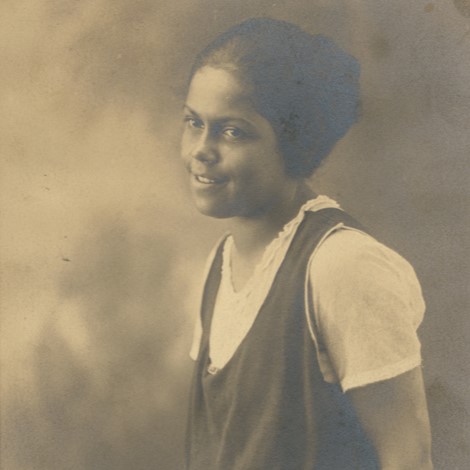Gwendolyn Bennett was born on July 8, 1902, in Giddings, Texas and spent her early childhood in Washington, D.C. She attended Brooklyn Girl’s High School and graduated in 1921. Bennett then enrolled at Columbia University’s Teachers College, while also studying in the university’s fine arts department. After two years at Columbia, Bennett transferred to the Pratt Institute. Bennett published her first poem, “Nocturne,” in the November 1923 issue of Opportunity magazine. She also designed the magazine cover for the Crisis’s December 1923 issue. From 1924 to 1927, she taught art at Howard University, but took a year-long leave in 1925 to study art in Paris on a scholarship. She was forced to resign from Howard, however, in 1927 after she became engaged to a medical student. Bennett published over twenty poems in the 1920s. She also completed a great deal of artwork, much of which was destroyed in two fires—one at Bennett’s mother-in-law’s home in 1926, and another at her stepdaughter’s home in the early 1980s. In 1928, Bennett relocated to Eustis, Florida, with her first husband, Alfred J. Jackson, and stopped writing her column. She ceased to publish for several years. Instead, she taught art and Spanish at a local high school. During this 1930s, she struggled with alcoholism. Bennett returned to New York, settling in Hempstead, in 1932. She worked odd jobs before taking a post with the Works Progress Administration (WPA) Art Project from 1935–41. In 1936, she directed the Harlem Arts Guild. In 1940, she married Richard Crosscup, a white Harvard graduate and fellow teacher. She was suspended from her post at the Harlem Art Center after coming under scrutiny from the House Un-American Activities Committee (HUAC). Bennett remained an object of the committee’s scrutiny well into the 1950s. From 1948 to 1968, she worked for the Consumers Union, until she and Crosscup decided to open and operate an antiques shop in Pennsylvania. Bennett died on May 31, 1981, in Reading, Pennsylvania. She survived her second husband by one year. Source

